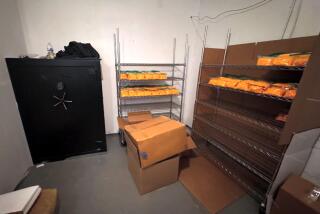PCP Raid Shocks Affluent Neighborhood : Narcotics: Three Whittier residents were arrested and a drug inventory worth more than $25 million on the street was seized.
- Share via
WHITTIER — The discovery of an illegal narcotics lab in Whittier has forced investigators to re-evaluate the threat posed by PCP, an anesthetic-like drug that can provoke confrontational and violent behavior in its users.
“PCP has had a lot of bad press and is very dangerous and people understood this,” said Edward Synicky, a special narcotics agent with the state Justice Department. “We practically eliminated it in the 1970s.”
In the last six months, however, Synicky and other investigators have noticed a rise in PCP use among Latino gang members in the region. Investigators say these youths had traditionally avoided the drug, which has a poor reputation even among some narcotics users.
An early morning Mother’s Day raid in Whittier’s exclusive Friendly Hills and at two nearby storage facilities underscored law enforcement concerns. Police netted three suspects and a PCP inventory that could have earned its makers more than $25 million on the street.
Investigators say the operation is the biggest Southern California PCP lab they have discovered in at least five years.
“It was a giant lab,” Synicky said. “It was one of the largest that state narcotics has ever taken down.”
Police arrested Whittier residents Julian Robert Garcia, 33, his wife Susan, 31, and his brother, Ruben, 30, on suspicion of manufacturing and possessing for sale an illegal substance, namely phencyclidine or PCP.
In addition to raiding the Garcia home in the 15200 block of Youngwood Drive, investigators from state and local agencies obtained search warrants for self-storage lockers rented by the Garcias in Pico Rivera and Whittier.
At the Pico Rivera facility, officers found two gallons of PCP and about 75 gallons of PCC, a chemical that can be quickly converted to PCP. At the Whittier storage site, agents found two more gallons of PCP and assorted drug paraphernalia.
Officers estimate the PCP alone to be worth $1,280,000 because the four gallons could have been used to lace 64,000 cigarettes, which sell for about $20 apiece. The 75 gallons of PCC could have been converted to PCP worth upwards of $24 million.
By comparison, Whittier police have never found more than 10 or 12 ounces of PCP, said Sgt. Don Desmaretz, head of the Whittier narcotics unit. “This is unique,” he said. “This was very sophisticated.”
Two days after his arrest, Julian Garcia pleaded guilty. He is in County Jail awaiting sentencing and faces up to 17 years in prison, said Ellen Berk, the county deputy district attorney prosecuting the case.
Authorities released Susan Garcia on $50,000 bail. Ruben Garcia remains in jail in lieu of $750,000 bail.
The Mother’s Day raid was the result of four months of surveillance and investigation by the Orange County Lab Enforcement Team; police departments from Whittier, Ontario and Pomona, and the federal Bureau of Alcohol, Tobacco and Firearms.
“We had information he was dealing with chemicals that he didn’t have a need for,” said Desmaretz of Julian Garcia, who ran a business called Simply Green Lawn Care and Maintenance.
Although the firm is listed in the Whittier telephone directory, “At the times we followed the guy, it didn’t appear they were conducting any (lawn-care) business,” Desmaretz said.
The inquiry into the Garcias’ source of income continues. The family was remodeling the rambling, one-story home they bought recently for $450,000. Other recent purchases include two 1990 Cadillac El Dorados and a 1990 Ford four-wheel-drive pickup with an extended cab.
Officers descended upon the Youngwood Drive home at 7:30 a.m. and arrested Susan Garcia. When the Garcia brothers drove past moments later in a late-model white Toyota pickup, they did not stop. Squad cars followed the Garcias and pulled them over at a nearby intersection.
“When you see 15 policemen run down the street with guns in their hands, it’s spooky,” said one neighbor, who said she was afraid to give her name.
Desmaretz said PCP, which creates a euphoria and causes hallucinations, can make the user violently aggressive. The drug’s anesthetic properties can also temporarily remove a person’s pain reflex, making users difficult to handle. Because “they feel no pain,” he said, “a small person could throw three policemen around like rag dolls.”
The manufacture of the narcotic, aside from being illegal, also is a safety hazards.
“They use extremely volatile solvents,” said Pasquale Paduano, an official with Disposal Control Service, the Upland company that removed the PCP. “There’s a potential that someone walking into the yard with a cigarette could blow the house up.” He added that some of the chemicals release toxic vapors the instant they come in contact with water.
At the same time, PCP is relatively simple to make, Paduano said, involving less than a dozen chemicals. “It’s pretty much stir and pour and within a day or so you have PCP.”
The families of those making the PCP face the highest risk from the manufacturing process, Paduano said, noting that the labs are geared more toward secrecy than safety. He said the drug can be absorbed through the skin on contact.
Neighbors said they did not know the Garcias, who moved from the Chino area with their three children, ages 14, 12 and 2.
The raid shocked residents, who expressed surprise that their prosperous enclave could become home to an alleged narcotics lab.
“It’s rather scary because I have small children,” one woman said. “Now, I don’t want my kids to play in the front yard anymore.”
More to Read
Sign up for Essential California
The most important California stories and recommendations in your inbox every morning.
You may occasionally receive promotional content from the Los Angeles Times.














